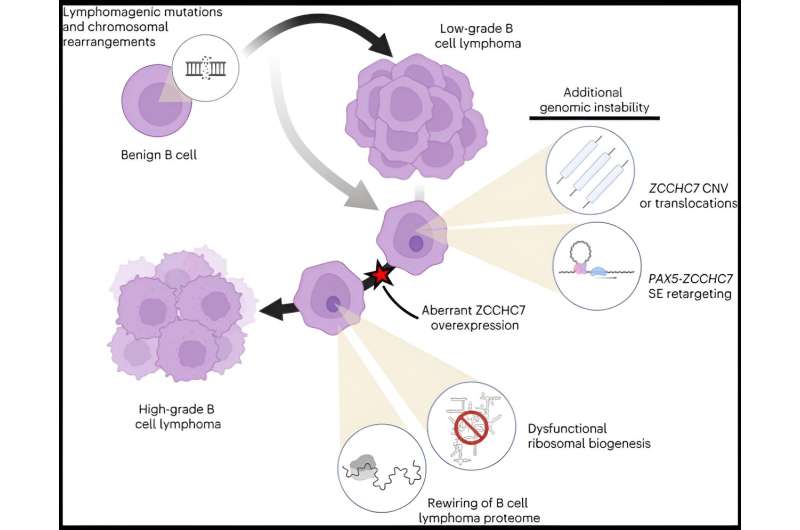This article has been reviewed according to Science X's editorial process and policies. Editors have highlighted the following attributes while ensuring the content's credibility:
fact-checked
peer-reviewed publication
trusted source
proofread
Genomic data shed light on how lymphoma can turn lethal

A study by researchers at Columbia and the Hong Kong University of Science and Technology is helping to clarify how low-grade lymphoma changes as it develops into a more aggressive tumor, which could lead to the development of new treatments.
The findings are published in the journal Nature Genetics.
Though often incurable, many low-grade B-cell lymphomas are slow to develop and not life-threatening. Among some patients, however, the tumors transform into more aggressive lymphomas and pose a greater threat.
The transformation into more aggressive disease is thought to be assisted by a protein called AID that creates mutations throughout the B-cell genome. But the features and consequences of many of these mutations remain hidden.
To better understand how AID changes the genome and transforms lymphoma, a team led by Columbia researchers Rebecca Leeman-Neill, MD, Ph.D., and Uttiya Basu, Ph.D., and their HKUST collaborators, Dong Song and Jiguang Wang, Ph.D., tapped into a unique collection of tumor samples from patients whose follicular lymphoma transformed into a much more aggressive type called double-hit lymphoma.
Using samples collected at different times during the patients' disease progression, the team was able to carry out whole genome sequencing of each tumor to track the mutations that accrued during transformation.
The genomic data revealed that transforming mutations were concentrated in noncoding, superenhancer-embedded promoter regions of many genes and altered gene expression in lymphomas in unexpected ways.
"We expected mutations in these regions to affect the transcription of genes normally controlled by the mutated promoters, but we also found that the enhancer-promoter interactions were rewired, affecting expression of other neighboring genes," Leeman-Neill says.
The researchers investigated the consequences of one particularly common transformation-associated mutation, in the PAX5 promoter, which resulted in rewiring of enhancer-promoter interactions, to turn on the ZCCHC7 gene. Those changes altered ribosome biogenesis, leading to widespread changes in protein synthesis in lymphoma cells, including a decline in the synthesis of DNA repair proteins, tumor suppressors, and proteins targeted by currently available therapeutics.
The findings also suggest that enhancer retargeting is widespread during lymphoma progression.
"These changes may reveal potential opportunities for treating aggressive lymphomas or even preventing their development," Leeman-Neill says
More information: Rebecca J. Leeman-Neill et al, Noncoding mutations cause super-enhancer retargeting resulting in protein synthesis dysregulation during B cell lymphoma progression, Nature Genetics (2023). DOI: 10.1038/s41588-023-01561-1


















